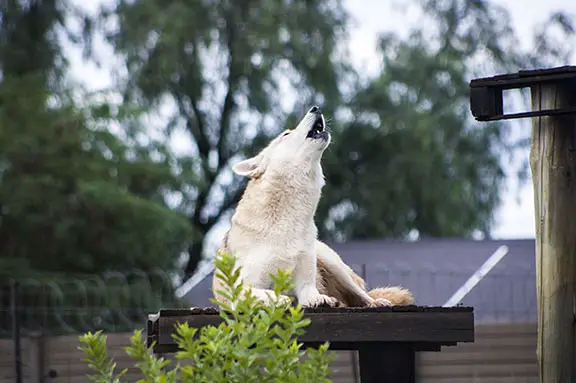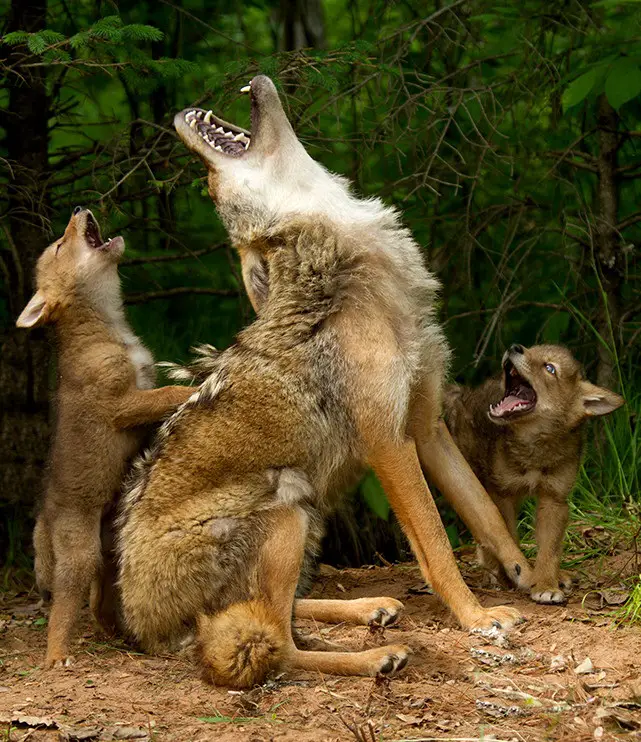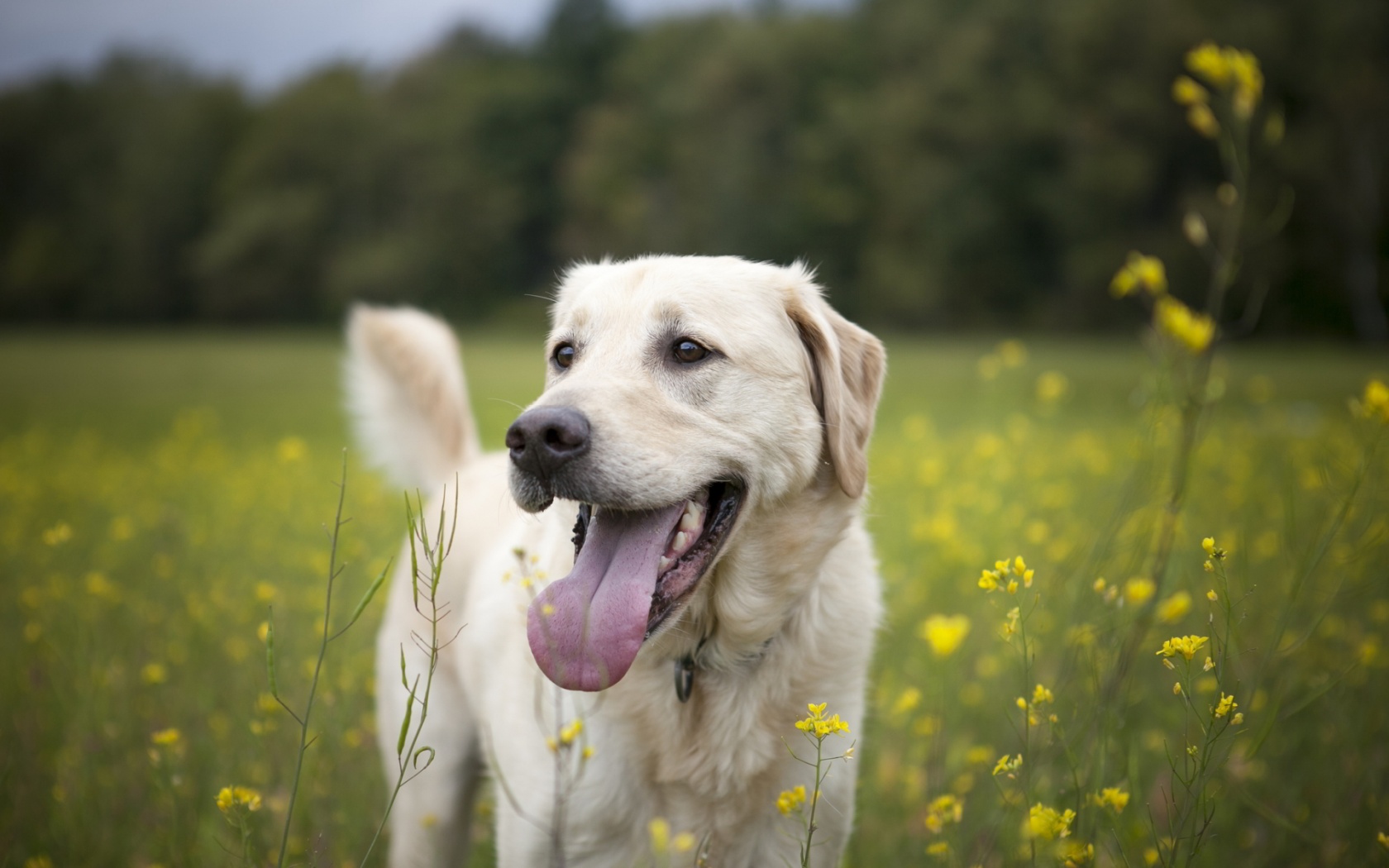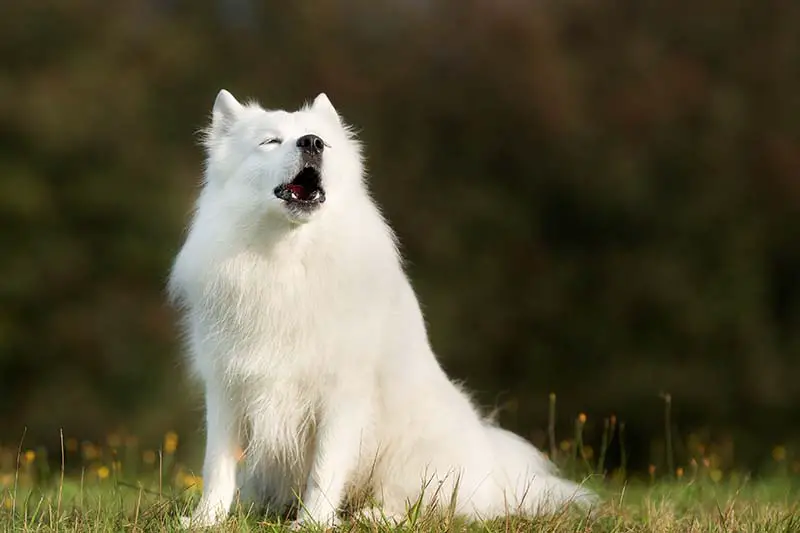Table of Contents
*This post may contain affiliate links. As an Amazon Associate we earn from qualifying purchases.

There are many superstitions surrounding why dogs howl. However, the answer is simpler than you might think. Have you always wondered, why do dogs howl? In this article, we go over the various reasons why dogs howl, from the scientific to the superstitious.
Animals communicate in many different ways, from sonar to signing to howling. For wolves and coyotes, howling is the primary vocalization used for communicating with other animals. Just like human beings talk, and dogs bark, wolves and dogs howl to signal to other wolves about prey, predators, and for general socializing.
Wolves are not the only species that howl to communicate. In fact, dogs and coyotes also howl on occasion. Canine howling has puzzled scientists and the general public for a long time. However, in recent years the reasons behind why dogs howl have become better understood.
Have you ever wondered, why do dogs howl? If you have ever had a dog as a pet, chances are you have. If so, we have good news for you. Today is the day you finally find out. In this article, our experts break down the various reasons why dogs howl. No longer will you have to wrack your brain with the question: why do dogs howl?
Howling 101

Howling is not a form of communication reserved for wolves alone. According to the experts at National Geographic, canines, monkeys, and even mice are capable of howling. Howling is not always recognized as howling, since its sound tends to vary according to the creature. For example, a howling mouse will sound nothing like a howling wolf.
Howling As An Animal Identifier

Biologists often identify the presence of certain animals by the sound they produce when howling. For example, senior biologists at Yellowstone National Park in Wyoming analyze the sound of howling at night to determine what kind of species of wolf is lingering in the woods and how many of them are concentrated in a region of the park.
Interestingly, howling varies by season as well. The sound that a wolf makes when howling in the winter does not resemble the sound made during a spring or summer howl. During cold weather seasons, a wolf’s howl will not carry as far as it would during the summertime.
Since howling is integral for biologists to identify animal species, howling is an important and welcome part of the natural world. Without howling, it would be more difficult to track the movement of animals, identify their species, and warn the public about the potentially dangerous presence of predators.
Who Howls?
Howling is a communication form native to the Canidae family, or “canine” family, of animals. Within this animal family we find species such as coyotes, jackals, and even household dog breeds.
However, more animal species howl than just those found in the Canidae family. For instance, rare breeds of mice are known to quietly produce squeak-like howls and monkeys and apes are also prone to howling within the jungles of Africa or South America. You may have heard of the rare “howler monkey” species—well, they were given that name for a reason.
Do Dogs Howl?
Despite popular belief that only wolves howl, dogs do, in fact, howl. In fact, howling is one of the most popular forms of vocalization with which dogs communicate. A wide variety of dogs, primarily those that are found in natural habitats, howl on a daily basis to communicate with family members and both predators and prey alike.
What Does Dog Howling Sound Like?
The sound of a dog’s howl will vary from dog to dog. However, most dog howls involve a high-pitched and prolonged sound that resembles an emergency siren. Often, a dog’s howl will echo through an open-air environment so that it almost sounds like it is ringing or reverberating.
The Reasons Why Dogs Howl
Like wolves, dogs howl for a variety of reasons. To help you understand the various reasons why dogs, and possibly your own dog, howl we put together this quick list. Below you will find all of the various purposes for dog howling.
Social Communication
Wild dogs naturally howl to communicate with other members of their pack. Other pack members listen for howls so they can understand where their fellow pack members are and if they are in distress. In other words, howling allows pack members to find each other. There is also evidence to suggest that pack members’ howls closely resemble each other.
Marking Their Territory
Like wolves, dogs are territorial creatures. This is why they sometimes wolve to mark their territory. When wild dogs howl, they signal to the other animals in the area that they are present and that the space around them is not to be intruded upon. Triggering a territorial howl also lets the other pack members know that they are protected within their shared territory.
Anxiety And Separation
Any dog owner knows that dogs do not handle separation well. Most dogs feel anxious when they separate from their owners, if they are domesticated, or their pack members, if they are in the wild. When dogs howl, they signal to their pack members that they are missing. Fellow pack members hear the howl and then howl in response to let them know that help is on the way.
Joy And Excitement

Dogs are excitable creatures. This is why dogs often howl in glee when they achieve success or feel particularly overjoyed. Sometimes, successful dogs will loudly howl to celebrate their achievements and to let everyone around them know. Sometimes they howl after a successful hunt or if they have done well on a group task, such as locating a shelter.
Medical Distress
Occasionally, dogs that are in medical distress will howl to alert their owner or pack members that they are hurt and need help. You may have noticed that stray dogs that with a limp tend to howl. This is because it is their natural instinct to respond to pain and distress in this way. If your dog is howling, you may need to check to see if they are in pain or have suffered an injury.
Seeking Attention
Like most animals, dogs want love, affection, and a healthy dose of attention. Usually, dogs that feel neglected will howl to attract attention from their owner or their fellow pack members. Attention-seeking behavior is not uncommon among dogs, especially when you consider that dogs are among the most social animals in the natural world.
Upset Mood Or Irritation

Just like humans, dogs can get easily upset or annoyed. When dogs feel irritated or in a bad mood, they can sometimes vent their frustrations by howling loudly. On some occasions, an irritable high-pitched noise such as a car alarm or an alarm clock can trigger a howl in response. This is especially true if your dog is sensitive to loud noises.
Coping With Isolation
When dogs are left alone, they can become distraught and will start to crave social contact. After all, it is not uncommon for dog owners to come home after a long day away to find that their upset dog has chewed up the couch cushions or drapery. This is because dogs need constant affection and socializing, or else they will resort to howling to express themselves.
Loud Or Abrasive Noises
Dogs are irritated by loud, high-pitched noises. Most dog owners notice that their dogs will sometimes run and hide, or whimper, when they are exposed to sharp sounds or noises such as screeching. Since howling is a natural response to dangerous or uncomfortable environments for dogs, dogs will react accordingly to piercing noises.
Is It Normal For Dogs To Howl At Night?
Many assume that dogs and wolves only howl at night. This is perhaps due to the popular depiction of wolves and other canines howling at the moon in television shows and movies. However, dogs howl at all times of the day.
While it is normal for dogs to howl at any time of day, they are especially prone to howling at night. This is simply because they have more reasons to howl in the darkness. After all, they are more likely to be in distress, lose their pack, or otherwise need help during the dark of the night. This is why most stray dogs howl at night.
What To Do If Your Dog Howls Excessively
Why do dogs howl? As we have discussed, there are many reasons why your dog may be howling. However, if there is one thing to be taken away from today’s article, it is that howling is a natural and normal aspect of a dog’s social life. While howling may be a sign of distress, there is no reason to assume that a dog needs help if they are howling.
There is no way to train a dog not to howl. However, if your dog is howling excessively it is important that you check your dog for injuries. If no injuries are present, there is no reason to be alarmed. Your first reaction should be to give your dog the love and attention they need—usually, that’s all it takes to quiet a howling dog.
Things your Dog Needs
[amazon box=”0765388111,B00NABTG60,B00L3O4JI6″ grid=”3″]

